Expert Perspective on Social Media Harm
- Last Updated: June 12th, 2025

Attorney Jessica Paluch-Hoerman, founder of TruLaw, has over 28 years of experience as a personal injury and mass tort attorney, and previously worked as an international tax attorney at Deloitte. Jessie collaborates with attorneys nationwide — enabling her to share reliable, up-to-date legal information with our readers.
Legally Reviewed
This article has been written and reviewed for legal accuracy and clarity by the team of writers and legal experts at TruLaw and is as accurate as possible. This content should not be taken as legal advice from an attorney. If you would like to learn more about our owner and experienced injury lawyer, Jessie Paluch, you can do so here.
Fact-Checked
TruLaw does everything possible to make sure the information in this article is up to date and accurate. If you need specific legal advice about your case, contact us by using the chat on the bottom of this page. This article should not be taken as advice from an attorney.
Key takeaways:
- Excessive social media use is linked to heightened risks of depression and anxiety.
- User privacy is often compromised, raising alarms over personal data security on social platforms.
- Combatting cyberbullying and misinformation is essential for a safer social media environment.
Overview of Social Media Harm
On this page, we’ll discuss an expert perspective on social media harm, the negative psychological effects of social media platforms, who qualifies to file a social media addiction lawsuit, and much more.
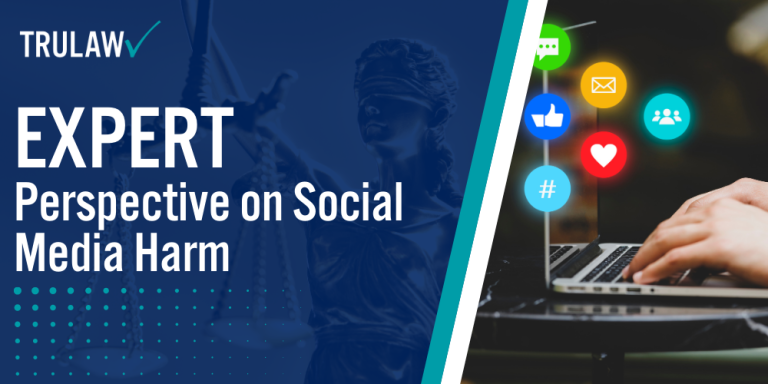
Intro To Social Media Harm
The rise of social media has brought with it a host of unintended consequences, particularly in terms of mental health and well-being. Experts are increasingly concerned about the harmful effects of social media, especially on younger users.
Here are some of the key ways in which social media can cause harm:
- Addiction: The constant need to check and engage with social media can lead to addictive behaviors.
- Depression and Anxiety: Social comparison and fear of missing out (FOMO) can contribute to feelings of inadequacy and low self-esteem.
- Cyberbullying: The anonymity of social media can enable bullying behaviors, causing significant emotional distress.
- Sleep Disruption: Late-night social media use can interfere with sleep patterns, impacting overall health and well-being.
If you or a loved one has experienced mental health issues or addiction as a result of social media use, you may qualify to pursue compensation.
Contact TruLaw using the chat on this page to receive an instant case evaluation to determine if you qualify to file a social media harm lawsuit today.
Table of Contents
The Rise of Social Media and Its Impact on Society
In the span of just a few decades, social media has reshaped the landscape of human interaction and community building, marking a pivotal shift in how individuals exchange information and forge connections.
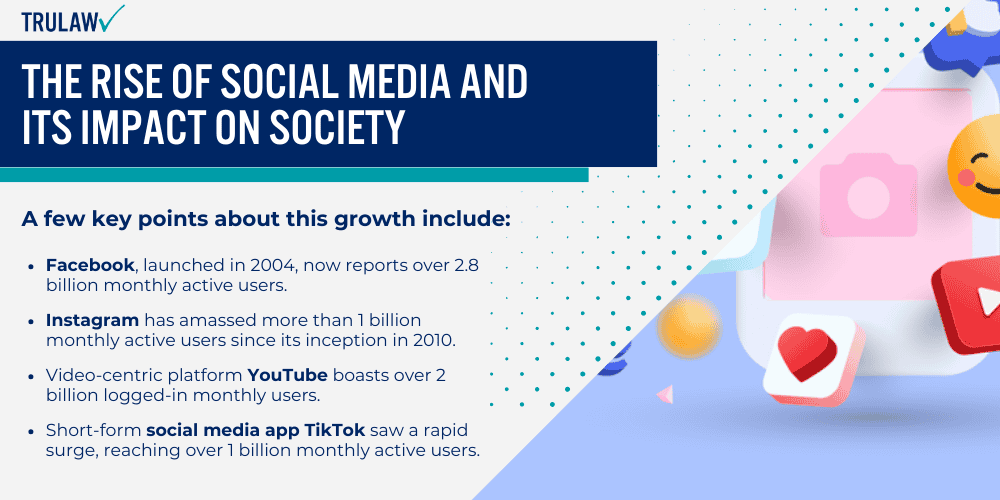
The Rapid Growth and Adoption of Social Media Platforms
Social media platforms have witnessed exponential growth, with billions of individuals flocking to these digital spaces.
A few key points about this growth include:
- Facebook, launched in 2004, now reports over 2.8 billion monthly active users.
- Instagram has amassed more than 1 billion monthly active users since its inception in 2010.
- Video-centric platform YouTube boasts over 2 billion logged-in monthly users.
- Short-form social media app TikTok saw a rapid surge, reaching over 1 billion monthly active users.
This dramatic adoption of social media reflects its deep entrenchment in daily life, affecting many aspects of society, from business to individual personal growth.
Transforming the Way People Connect and Communicate
Social media has become an integrated thread in the fabric of our daily lives, weaving a web of constant connection and fostering a new era of information sharing.
It has enabled real-time communication across the globe, breaking down geographical barriers.
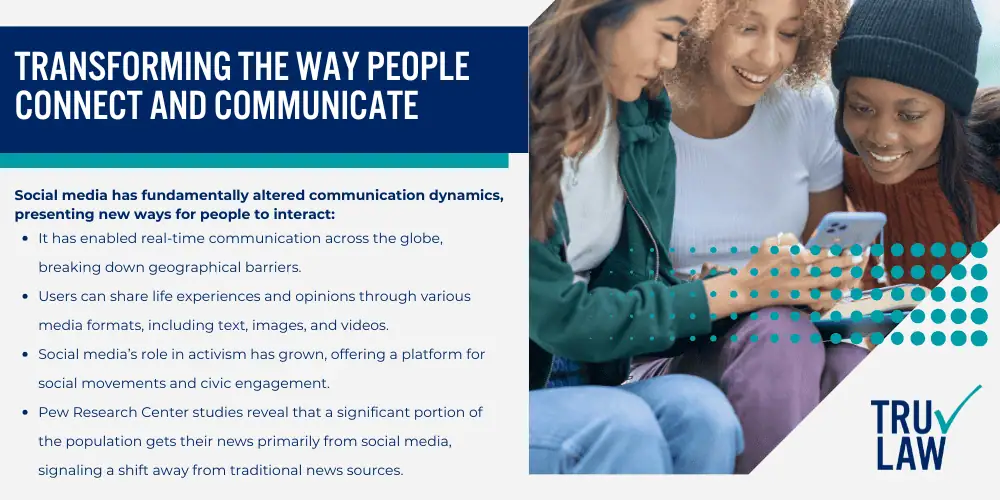
Social media has fundamentally altered communication dynamics, presenting new ways for people to interact:
- It has enabled real-time communication across the globe, breaking down geographical barriers.
- Users can share life experiences and opinions through various media formats, including text, images, and videos.
- Social media’s role in activism has grown, offering a platform for social movements and civic engagement.
- Pew Research Center studies reveal that a significant portion of the population gets their news primarily from social media, signaling a shift away from traditional news sources.
The influence of social media on society’s communication is clear and ongoing, with platforms continuing to evolve and adapt to their users’ needs and behaviors.
Psychological Risks Associated with Social Media Use
The rise of social media use, especially among young people, has surfaced concerns regarding its potential impact on mental health.
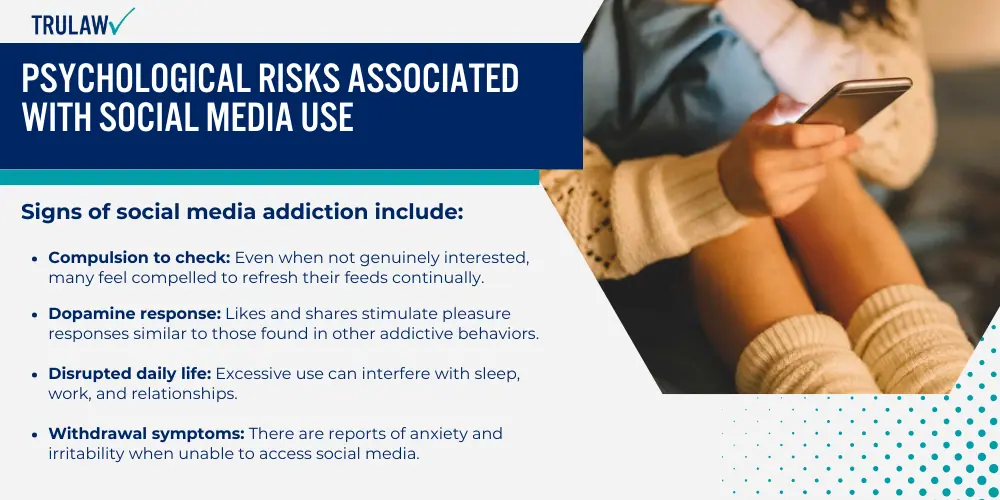
This section examines specific psychological risks that are associated with habitual social media interaction.
Addiction and Compulsive Behavior
Social media addiction is becoming increasingly evident, with platforms designed to trigger the brain’s reward center.
This can lead to a cycle of compulsive behavior, where individuals feel the need to check notifications and feeds constantly.
Signs of social media addiction include:
- Compulsion to check: Even when not genuinely interested, many feel compelled to refresh their feeds continually.
- Dopamine response: Likes and shares stimulate pleasure responses similar to those found in other addictive behaviors.
- Disrupted daily life: Excessive use can interfere with sleep, work, and relationships.
- Withdrawal symptoms: There are reports of anxiety and irritability when unable to access social media.
Anxiety, Depression, and Low Self-Esteem
The link between teen social media use and various negative mental health outcomes is a growing concern.
Teens report feelings of inadequacy and heightened stress stemming from their online presence.
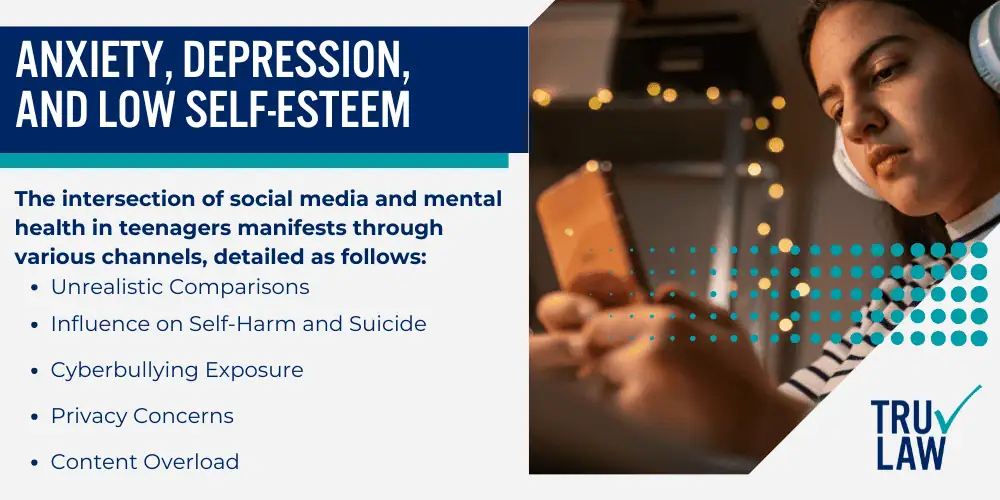
The intersection of social media and mental health in teenagers manifests through various channels, detailed as follows:
- Unrealistic Comparisons: Being bombarded with idealized images of others’ lives can result in negative feelings of inadequacy.
- Influence on Self-Harm and Suicide: A systematic narrative review has highlighted the proliferation of self-harm content on social networks, which can influence behaviors.
- Cyberbullying Exposure: Social media can be a conduit for harassment, which can lead to emotional distress.
- Privacy Concerns: Anxiety over personal data and online persona can contribute to a sense of vulnerability.
- Content Overload: The sheer volume of information can become overwhelming and lead to poor mental health.
Fear of Missing Out (FOMO) and Social Comparison
FOMO is a notable driver of anxiety associated with social media, where users feel left out of shared experiences.
Social comparison can exacerbate concerns about where one stands in relation to peers.
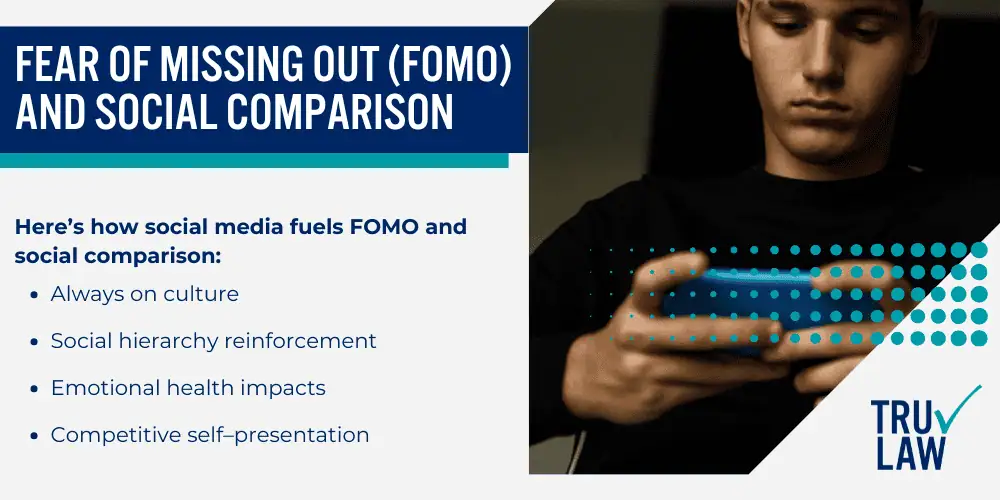
Here’s how social media fuels FOMO and social comparison:
- Always on culture: The pressure to be constantly updated heightens the fear of missing out.
- Social hierarchy reinforcement: Online status can affect offline perceptions and self-worth.
- Emotional health impacts: Young people’s mental health can suffer from the relentless comparison to peers on social media.
- Competitive self–presentation: The effort to showcase an idealized life can lead to emotional exhaustion and dissatisfaction.
Cyberbullying and Online Harassment on Social Media
With the increasing integration of social media into daily life, particularly among the younger population, the problem of cyberbullying has emerged as a prominent issue.
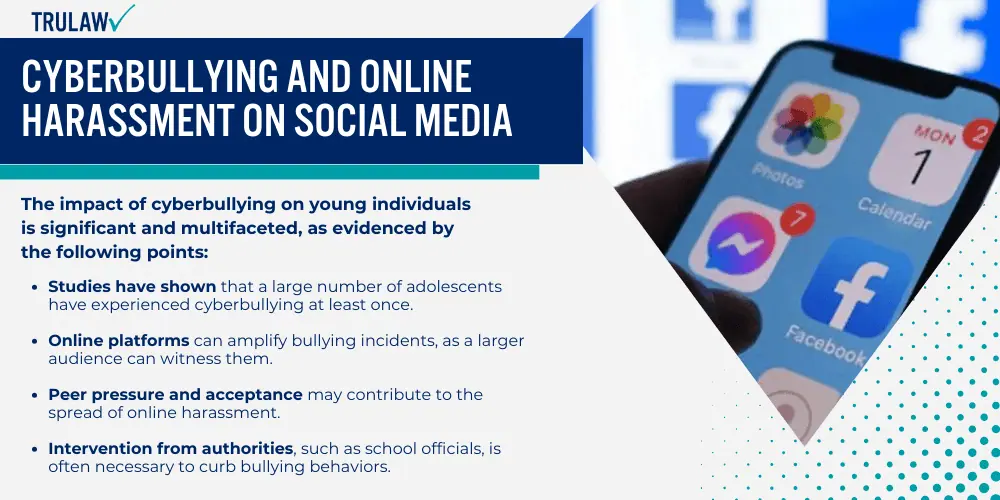
This prevalent form of harassment inflicts psychological harm and poses significant mental health risks.
The Prevalence of Cyberbullying Among Youth
Cyberbullying affects a considerable portion of the youth community.
Due to the ubiquity of social media platforms, harmful interactions can occur frequently and with ease.
The impact of cyberbullying on young individuals is significant and multifaceted, as evidenced by the following points:
- Studies have shown that a large number of adolescents have experienced cyberbullying at least once.
- Online platforms can amplify bullying incidents, as a larger audience can witness them.
- Peer pressure and acceptance may contribute to the spread of online harassment.
- Intervention from authorities, such as school officials, is often necessary to curb bullying behaviors.
Anonymity and the Lack of Accountability in Online Interactions
The veil of anonymity on social media can encourage individuals to participate in or initiate bullying without the fear of immediate consequences.
The ease with which individuals can hide their identities online contributes to a range of issues surrounding cyberbullying, as detailed below:
- Teen social media accounts can be created with false identities.
- Harassment can be conducted from behind a screen, reducing the perpetrator’s sense of culpability.
- Lack of face-to-face interaction diminishes empathy towards the victim.
- Digital world footprints are not always traceable, complicating efforts to address the problem.
Long-Term Effects of Cyberbullying on Mental Health
Experiences of cyberbullying have a profound impact on the mental health of young people, potentially leading to long-term emotional and psychological distress.
Here are some of the long-term effects of cyberbullying on mental health:
- Mental health issues such as depression and anxiety can be exacerbated or triggered by cyberbullying.
- Self-esteem can be significantly damaged due to the public nature of online harassment.
- Suicidal thoughts and behaviors have been linked to intense or prolonged cyberbullying incidents.
- Support systems, including counseling and family involvement, can play a critical role in recovery and resilience.
Misinformation and Fake News on Social Media Platforms
In today’s digital landscape, social media platforms serve as a major crossroads for public discourse, which unfortunately includes the dissemination of misinformation and fake news.
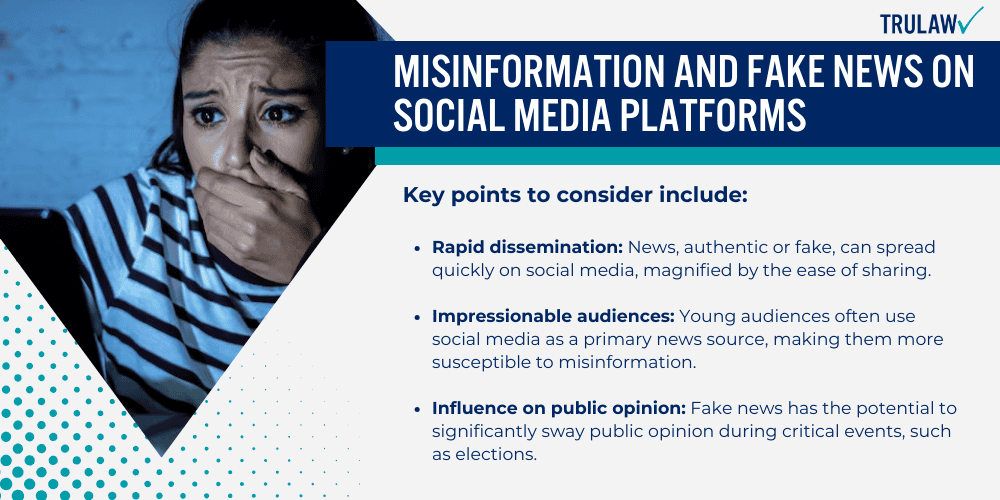
These phenomena have tangible effects on society, particularly when it comes to influencing public opinion and reinforcing biased beliefs.
The Spread of False Information and Its Impact on Public Opinion
On platforms like Twitter and Facebook, false information travels at alarming speeds, shaping the perceptions of users and often leading to widespread misinformation.
Studies have noted the ability of social media to outpace traditional news sources, enabling the dissemination of large volumes of fake news for various reasons.
Key points to consider include:
- Rapid dissemination: News, authentic or fake, can spread quickly on social media, magnified by the ease of sharing.
- Impressionable audiences: Young audiences often use social media as a primary news source, making them more susceptible to misinformation.
- Influence on public opinion: Fake news has the potential to significantly sway public opinion during critical events, such as elections.
- Persistence of impact: Although fake news may have a shorter ‘life’ on the internet, its consequences can be long-lasting.
Echo Chambers and the Reinforcement of Biased Beliefs
Social media algorithms create environments known as echo chambers, where users are exposed primarily to information that aligns with their existing beliefs.
Here are key aspects of this phenomenon:
- Selective exposure: Users often encounter only content that confirms their preconceptions, limiting diverse perspectives.
- Algorithmic tailoring: Social media algorithms may intensify this effect by showing content from like-minded individuals and groups.
- Reinforcement of convictions: Repeated exposure can deepen users’ convictions and contribute to polarized communities.
- Resistance to correction: Even when presented with factual information, individuals in echo chambers may dismiss it in favor of their established views.
The Role of Social Media Algorithms in Amplifying Misinformation
Algorithms used by social media platforms play a significant role in what content is promoted and seen by users.
They can inadvertently amplify misinformation through:
- Engagement-based ranking: Content that generates more engagement is often promoted, regardless of its truthfulness.
- Visibility of sensational content: Misleading or sensationalist content can receive greater visibility due to user interaction patterns.
- Lack of immediate fact-checking: Real-time algorithmic distribution doesn’t allow for comprehensive fact-checking before content reaches wide audiences.
- Challenges in moderation: The vast amount of content generated on social media poses challenges for effective moderation and removal of false information.
Privacy Concerns and Data Exploitation by Social Media Companies
In the digital age, privacy concerns and data exploitation have become pressing issues as social media companies gather and monetize vast amounts of personal information.
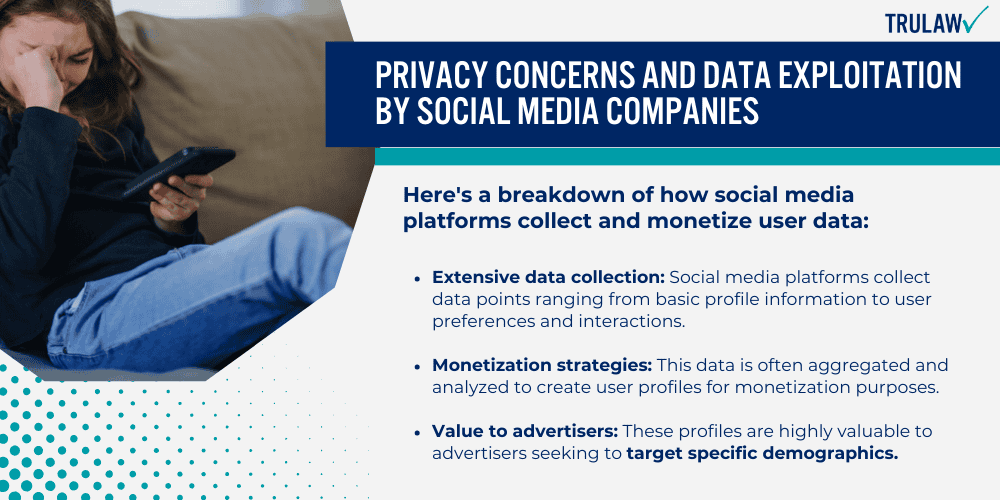
The Collection and Monetization of User Data
Social media apps are designed to encourage users to share personal details, which then become a commodity for the platforms.
Here’s a breakdown of how social media platforms collect and monetize user data:
- Extensive data collection: Social media platforms collect data points ranging from basic profile information to user preferences and interactions.
- Monetization strategies: This data is often aggregated and analyzed to create user profiles for monetization purposes.
- Value to advertisers: These profiles are highly valuable to advertisers seeking to target specific demographics.
- Impact on users: Users may not be fully aware of the extent of the data collected or how it’s used commercially.
Targeted Advertising and Manipulation of User Behavior
The use of personal data in targeted advertising can manipulate user behavior and influence decision-making.
The strategic use of personal information by companies and advertisers introduces various challenges and concerns, highlighted as follows:
- Personalized user experiences: Companies use the data to create personalized content and ads, which could shape users’ online habits.
- Perception shaping: This personalized content can also influence users’ perceptions and opinions.
- Advertiser influence: Advertisers harness these insights to sway purchasing decisions.
- Potential for misuse: If misused, the ability to influence can turn into manipulation, raising ethical concerns.
Risks of Identity Theft and Personal Information Leaks
Social media platforms have the responsibility to protect user data, but lapses can lead to significant risks.
Here’s how social media use can expose you to identity theft and personal information leaks:
- Security breaches can result in personal information being stolen, leading to identity theft.
- Data leaks: Even unintended leaks can put users’ personal data in the hands of malicious actors.
- Secondary data usage: Data gathered may be repurposed or sold, often without consent.
- User vigilance: It underscores the importance for users to be mindful of the data they share on these platforms.
By understanding the strategies employed by social media companies to collect and monetize user data, individuals can better safeguard their online privacy.
The Impact of Social Media on Relationships and Social Skills
Social media has significantly altered how people form and maintain relationships, affecting their social skills in profound ways.
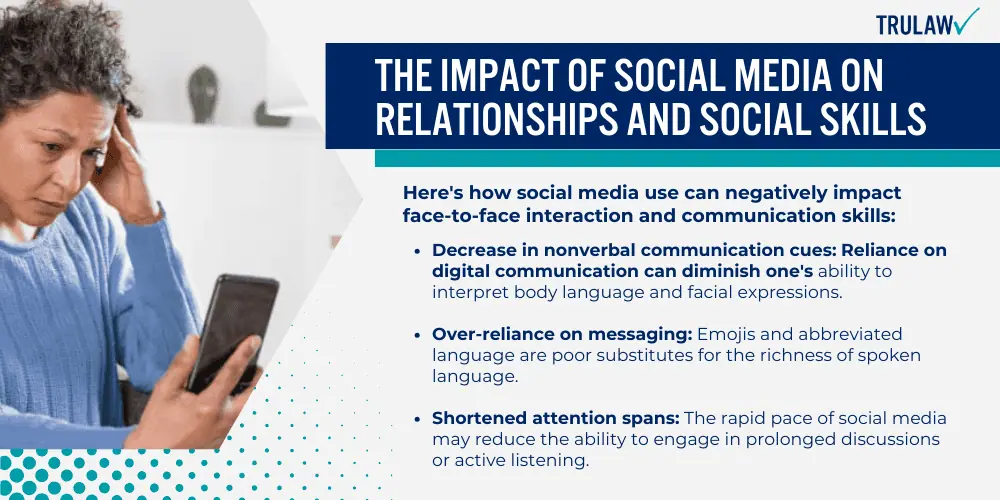
Decreased Face-to-Face Interaction and Communication Skills
Social media’s convenience often leads individuals to prefer digital interactions over face-to-face conversations.
This shift impacts social skills, with many finding in-person interactions more challenging.
Here’s how social media use can negatively impact face-to-face interaction and communication skills:
- Decrease in nonverbal communication cues: Reliance on digital communication can diminish one’s ability to interpret body language and facial expressions.
- Over-reliance on messaging: Emojis and abbreviated language are poor substitutes for the richness of spoken language.
- Shortened attention spans: The rapid pace of social media may reduce the ability to engage in prolonged discussions or active listening.
- Social anxiety: For some, especially adolescent girls, the safety of screened interactions on social media can make real-world interactions appear daunting.
Superficial Connections and the Erosion of Meaningful Relationships
Social media often promotes a number of connections over their quality, leading to superficial relationships.
Here’s how social media use can contribute to superficial connections and hinder the development of meaningful relationships:
- Instant gratification: Social media offers immediate responses that can hinder the development of patience necessary for deep relationships.
- Breadth over depth: With the ability to connect to hundreds online, the time and effort invested in individual relationships may decrease.
- Comparison: Seeing the highlight reels of others’ lives can lead to unrealistic expectations for one’s own relationships.
- Fear of Missing Out (FOMO): A constant awareness of others’ activities may detract from the enjoyment and appreciation of one’s direct social circle.
The Pressure to Maintain a Perfect Online Image
The curated nature of social media profiles can create immense pressure to project an idealized image which affects mental health, particularly concerning body image.
The drive to appear flawless on digital platforms leads to a range of psychological strains, as delineated below:
- Unrealistic standards: Platforms proliferate images leading to unrealistic body image expectations.
- Validation seeking: Likes and comments can become a sought-after form of validation, influencing self-esteem.
- Editing and filters: The norm of altering images before posting can propagate a distorted sense of normalcy.
- Comparison and jealousy: Continuous exposure to others’ curated lives can foster feelings of inadequacy and jealousy.
Social media’s role in shaping social media habits is complex, with particular considerations needed for vulnerable demographics, such as adolescent girls, who may face heightened challenges regarding body image and social comparison.
Strategies for Mitigating the Harmful Effects of Social Media
The surge in social media use has sparked serious discussions about its impact on adolescent health.
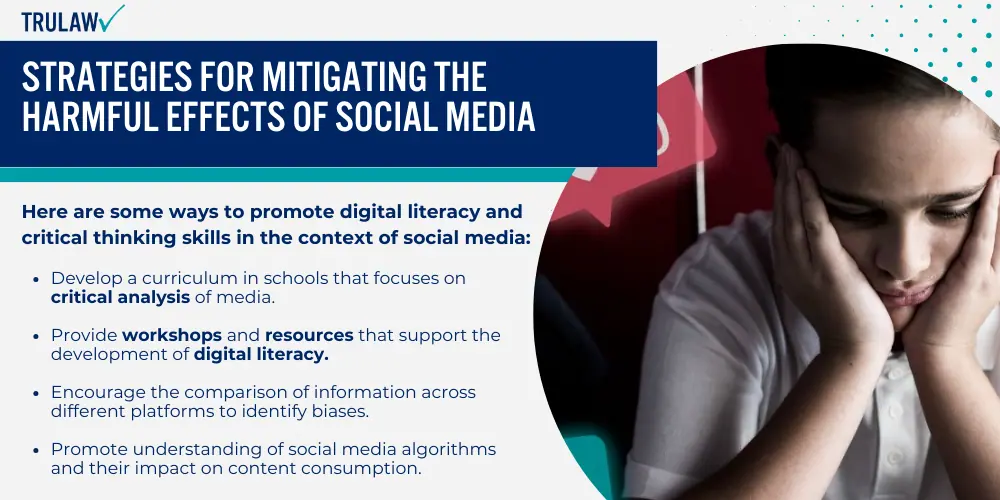
A multifaceted approach that includes education, self-regulation, and policy intervention is necessary to counteract potential harms.
Promoting Digital Literacy and Critical Thinking Skills
Educating the public about digital literacy is paramount to fostering discernment when navigating social media.
They can better identify credible information, thus reducing the spread and impact of misinformation.
High media literacy can be a shield against the negative influences of social media.
Moreover, with critical thinking skills, individuals are less susceptible to the harmful effects of excessive social media use.
For example, a study highlights that youths in a multi-ethnic Asian society have shown a capacity to employ strategies to mitigate the negative effects of social media use.
Here are some ways to promote digital literacy and critical thinking skills in the context of social media:
- Develop a curriculum in schools that focuses on critical analysis of media.
- Provide workshops and resources that support the development of digital literacy.
- Encourage the comparison of information across different platforms to identify biases.
- Promote understanding of social media algorithms and their impact on content consumption.
Encouraging Healthy Social Media Habits and Self-Regulation
Self-regulation plays a vital role in managing one’s social media habits.
By setting boundaries and recognizing the signs of excessive social media use, individuals can take control of their online activity and its impact on their well-being.
The Surgeon General’s advisory has brought attention to the importance of such self-regulation practices.
Here are some strategies to promote healthy social media habits and self-regulation:
- Limit daily screen time to prevent overexposure and potential negative impacts.
- Encourage regular social media breaks or ‘detoxes’ to recharge.
- Establish no-device times or zones within the home to encourage face-to-face interaction.
- In the case of a child’s social media usage, monitor and set appropriate content restrictions.
Implementing Stricter Regulations and Policies to Protect Users
Government and social media companies must work together to create policies and regulations that protect users from the harms of social media.
Stricter guidelines and accountability measures can make accessing social media safer, particularly for vulnerable populations like children.
To achieve these goals, the following steps are critical for enhancing the safety and integrity of social media platforms:
- Impose age restrictions to ensure the appropriateness of the content for a child’s social media access.
- Mandate transparency in algorithms to prevent manipulative practices that may lead to addiction.
- Enforce strict consequences for platforms that fail to protect users from harmful content.
- Support research into the long-term effects of social media use to inform future policy changes.
The Responsibility of Social Media Companies in Addressing Harm
Social media companies play a pivotal role in moderating content and safeguarding users from harm.
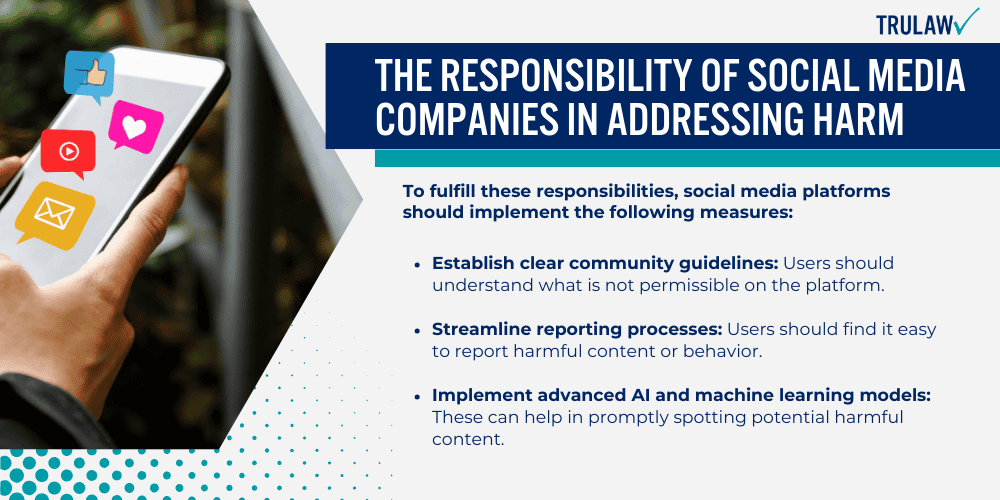
With the widespread impact these platforms have on society, the measures they take to address harmful content and behaviors are under continual scrutiny.
Developing Effective Content Moderation and Reporting Systems
Social media companies are responsible for creating and maintaining efficient and fair content moderation systems.
They must ensure that posts can be swiftly reviewed and action taken when necessary.
To fulfill these responsibilities, social media platforms should implement the following measures:
- Establish clear community guidelines: Users should understand what is not permissible on the platform.
- Streamline reporting processes: Users should find it easy to report harmful content or behavior.
- Implement advanced AI and machine learning models: These can help in promptly spotting potential harmful content.
- Employ a global team of content moderators: As noted by a National Center for Biotechnology Information (NCBI) article, companies like YouTube and Facebook have extensive teams dedicated to monitoring content.
Collaborating with Mental Health Experts and Researchers
It’s important for social media companies to work alongside experts to understand and alleviate the negative impacts of social media on mental health.
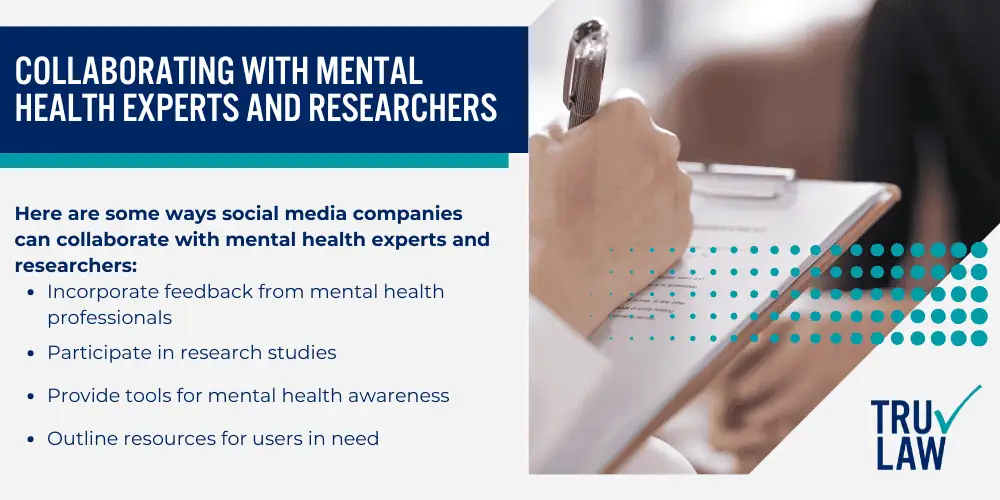
Here are some ways social media companies can collaborate with mental health experts and researchers:
- Incorporate feedback from mental health professionals: They can offer insights into the design features that might be problematic.
- Participate in research studies: Collaborate with academic institutions to study the effects of social media usage.
- Provide tools for mental health awareness: Support initiatives that educate users about mental wellness.
- Outline resources for users in need: Ensure that users have access to mental health resources through the platform.
Prioritizing User Well-Being Over Engagement and Profits
The welfare of users should be a primary concern for these companies, even if it might come at the cost of engagement metrics or profitability.
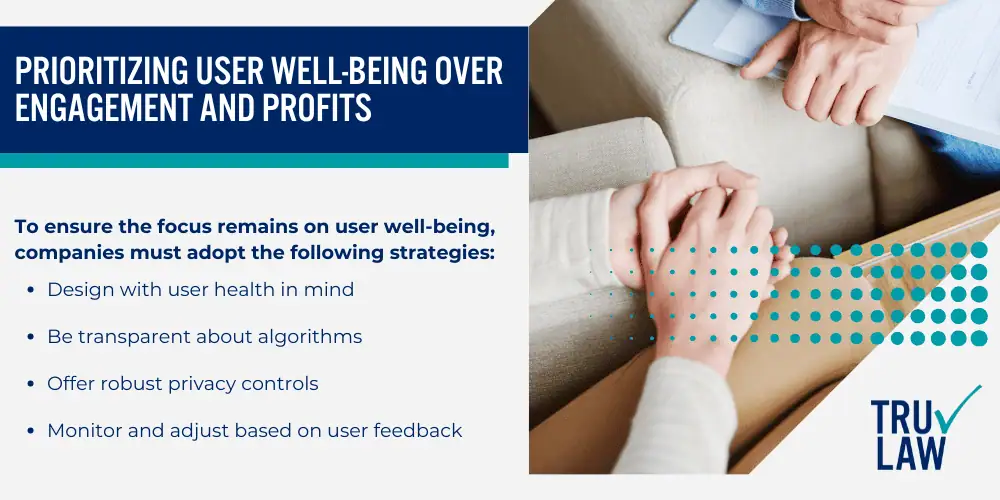
To ensure the focus remains on user well-being, companies must adopt the following strategies:
- Design with user health in mind: Optimize the user experience to foster a safer environment.
- Be transparent about algorithms: Users should understand how their behavior on the platform might impact their well-being.
- Offer robust privacy controls: Personal data must be handled with the highest level of confidentiality and respect.
- Monitor and adjust based on user feedback: Regularly assess the ways platform changes affect user satisfaction and safety.
The Future of Social Media and Its Role in Society
In the rapidly changing landscape of digital interaction, social media’s trajectory is closely tied to patterns of user behavior and digital technology advancements.
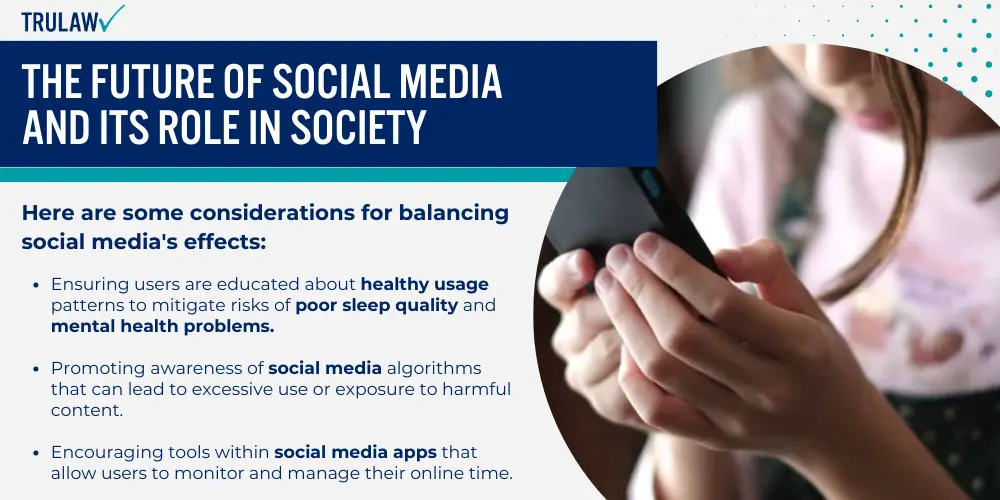
Balancing the Benefits and Risks of Social Media Use
Social media is a double-edged sword, capable of enriching and impairing mental well-being.
Its benefits can include strengthening connections and providing emotional support, while the profound risk may involve poor sleep quality and heightened social anxiety.
Here are some considerations for balancing social media’s effects:
- Ensuring users are educated about healthy usage patterns to mitigate risks of poor sleep quality and mental health problems.
- Promoting awareness of social media algorithms that can lead to excessive use or exposure to harmful content.
- Encouraging tools within social media apps that allow users to monitor and manage their online time.
- Addressing the impact of social media on specific conditions such as eating disorders and disordered eating behaviors.
Fostering a More Positive and Supportive Online Environment
The online ecosystem has the potential to either uplift or harm its users, making the cultivation of a positive social media environment pivotal.
To foster a supportive environment, the following steps should be taken:
- Development of robust systems to identify and reduce the spread of content that may exacerbate mental health conditions.
- Highlighting and amplifying positive aspects of social media, such as support groups and educational content.
- Implementing features that foster kindness and compassion, thereby reducing sentiments of social anxiety.
- Prioritizing the safety and well-being of young adults, a group particularly sensitive to online influence.
Adapting to Evolving Technologies and User Needs
Social media must keep pace with both emerging technological trends and the evolving demands of its user base.
Key areas of focus include:
- Integration of algorithms that prioritize user health outcomes over engagement metrics.
- Crafting resilient policies that protect users without stifling innovation and freedom of expression.
- Recognizing the influence of social media on users’ offline behaviors and adjusting functionalities accordingly.
- Incorporating user feedback to enhance platform interfaces and human services, ensuring they align with mental health best practices.
Social Media Harm Lawsuits Frequently Asked Questions
-
What are the psychological effects of social media consumption?
Social media consumption can alter users’ perceptions of reality and self-worth, with the potential to create feelings of envy and dissatisfaction.
It also offers instant gratification in the form of likes and comments, which may skew expectations for real-world interactions.
-
How does social media use impact mental health in adolescents?
Adolescents are particularly susceptible to the effects of social media, often experiencing anxiety, body image issues, and depression.
The Surgeon General has issued advisories on the negative impact of social media on youth, emphasizing its contribution to mental health decline.
-
Can excessive use of social media lead to addiction?
Yes, excessive use of social media can lead to behaviors commonly associated with addiction, such as neglect of personal life, mental preoccupation, escapism, and mood-modifying experiences.
Many users, especially teens, report difficulties when trying to reduce their social media usage.
-
What are the common negative consequences of social media on personal well-being?
Common negative consequences include disrupted sleep patterns, increased feelings of loneliness, and heightened stress levels.
Users may also face cyberbullying, which has been linked with increased suicidal thoughts and attempts in young adolescents.
-
How does online interaction through social media affect real-life social skills?
Frequent online interaction can impede the development of real-life social skills, such as empathy, non-verbal communication, and conflict resolution.
It often encourages briefer, less meaningful exchanges compared to face-to-face interactions.
-
In what ways can social media usage contribute to anxiety and depression?
Social media can amplify feelings of inadequacy and the pressure to maintain a certain public image, which can contribute to anxiety and depression.
A systematic review has found a consistent relationship between excessive social media use and poor mental health outcomes among youth.

Managing Attorney & Owner
With over 25 years of legal experience, Jessica Paluch-Hoerman is an Illinois lawyer, a CPA, and a mother of three. She spent the first decade of her career working as an international tax attorney at Deloitte.
In 2009, Jessie co-founded her own law firm with her husband – which has scaled to over 30 employees since its conception.
In 2016, Jessie founded TruLaw, which allows her to collaborate with attorneys and legal experts across the United States on a daily basis. This hypervaluable network of experts is what enables her to share the most reliable, accurate, and up-to-date legal information with our readers!
Additional Social Media Harm Lawsuits resources on our website:
Here, at TruLaw, we’re committed to helping victims get the justice they deserve.
Alongside our partner law firms, we have successfully collected over $3 Billion in verdicts and settlements on behalf of injured individuals.
Would you like our help?
At TruLaw, we fiercely combat corporations that endanger individuals’ well-being. If you’ve suffered injuries and believe these well-funded entities should be held accountable, we’re here for you.
With TruLaw, you gain access to successful and seasoned lawyers who maximize your chances of success. Our lawyers invest in you—they do not receive a dime until your lawsuit reaches a successful resolution!
AFFF Lawsuit claims are being filed against manufacturers of aqueous film-forming foam (AFFF), commonly used in firefighting.
Claims allege that companies such as 3M, DuPont, and Tyco Fire Products failed to adequately warn users about the potential dangers of AFFF exposure — including increased risks of various cancers and diseases.
Depo Provera Lawsuit claims are being filed by individuals who allege they developed meningioma (a type of brain tumor) after receiving Depo-Provera birth control injections.
A 2024 study found that women using Depo-Provera for at least 1 year are five times more likely to develop meningioma brain tumors compared to those not using the drug.
Suboxone Tooth Decay Lawsuit claims are being filed against Indivior, the manufacturer of Suboxone, a medication used to treat opioid addiction.
Claims allege that Indivior failed to adequately warn users about the potential dangers of severe tooth decay and dental injuries associated with Suboxone’s sublingual film version.
Social Media Harm Lawsuits are being filed against social media companies for allegedly causing mental health issues in children and teens.
Claims allege that companies like Meta, Google, ByteDance, and Snap designed addictive platforms that led to anxiety, depression, and other mental health issues without adequately warning users or parents.
Transvaginal Mesh Lawsuits are being filed against manufacturers of transvaginal mesh products used to treat pelvic organ prolapse (POP) and stress urinary incontinence (SUI).
Claims allege that companies like Ethicon, C.R. Bard, and Boston Scientific failed to adequately warn about potential dangers — including erosion, pain, and infection.
Bair Hugger Warming Blanket Lawsuits involve claims against 3M — alleging their surgical warming blankets caused severe infections and complications (particularly in hip and knee replacement surgeries).
Plaintiffs claim 3M failed to warn about potential risks — despite knowing about increased risk of deep joint infections since 2011.
Baby Formula NEC Lawsuit claims are being filed against manufacturers of cow’s milk-based baby formula products.
Claims allege that companies like Abbott Laboratories (Similac) and Mead Johnson & Company (Enfamil) failed to warn about the increased risk of necrotizing enterocolitis (NEC) in premature infants.
Here, at TruLaw, we’re committed to helping victims get the justice they deserve.
Alongside our partner law firms, we have successfully collected over $3 Billion in verdicts and settlements on behalf of injured individuals.
Would you like our help?
